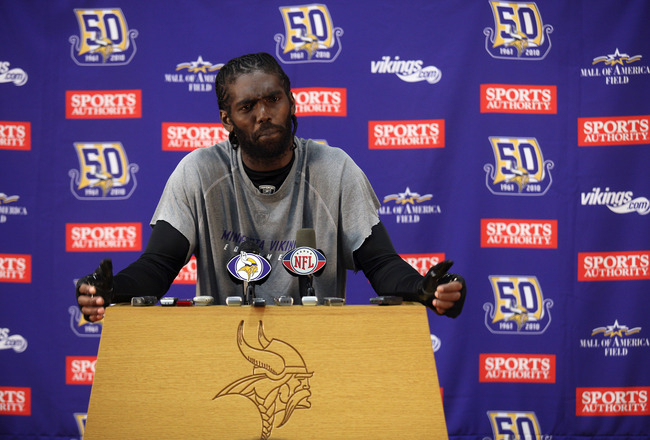The agent for former Vikings and Patriots wide receiver Randy Moss announced that Moss was retiring Monday, potentially calling an end to one of the most famous, and infamous, careers of any receiver in NFL history.
The news comes as a surprise, just weeks after the same agent, Joel Segal, claimed that Moss was in "freakish shape" as a result of "two-a-days, all spring and summer in West Virginia."
Players pondering retirement rarely put themselves through grueling two-a-day practices at home, which leads to speculation about Moss's "retirement" being a ploy to avoid a team's training camp.
The possibility remains that a team could offer Moss a contract if they suffer a rash of injuries, but for now, no offers appear forthcoming. Moss "retiring," therefore, is his way of telling the 32 NFL clubs, "You can't fire me, I quit."
If Moss does fade into the shadows in the same way Marvin Harrison did after his release from the Indianapolis Colts in early 2009, the Canton Clock starts now, counting down the five-year waiting period for his enshrinement.
Moss could become eligible for the Hall at the same time as another veteran wide receiver with eye-popping stats and equally impressive off-field baggage, Terrell Owens.
Like Moss, Owens has spent his last few seasons bouncing from team to team in search of the next big highlight. Their career numbers are similar, down to both catching exactly 153 career touchdowns to date.
So, if you had to make one wait to get into Canton, which would it be? The man who bagged 17 touchdowns as a rookie, or the one who took the torch from his 49ers predecessor, Jerry Rice? The player who immortalized the phrase "straight cash, homie" or the one who gave us the tearful "that's my quarterback"? The guy who tried to run over a meter maid or the one who liked to call press conferences in his driveway?
First, the numbers. T.O.'s advantages over Moss are 124 catches and 1074 yards in 17 extra games. Sizeable, but a motivated Moss could easily put the yards up. Catches are less likely. As said before, touchdowns are dead even. ADVANTAGE: Push.
Playoff performance: Moss erupted in his first several playoff games, recording nine scores in seven games. Only Gary Anderson's inexplicable case of the yips kept Moss from appearing in the Super Bowl as a rookie. From there, indifference took over. His best game from 2005 on was 5 catches, 62 yards and a score in Super Bowl XLII, when Eli and the Miracles snatched a ring from his grasp.
T.O.'s production was much more pedestrian, save lighting up the Giants in 2002 and his 122 yards for the Eagles in Super Bowl XXXIX, when he made a stirring return from a broken leg. ADVANTAGE: Moss
Team performance: Neither man won a Super Bowl, and each only appeared in one. Interestingly, though, the Patriots' loss to the Ravens after the 2009 season was the first time that Moss had been on a team that lost its first playoff game. Moss was on six playoff teams, Owens on eight.
Still, the Dallas teams that T.O. was on had to rank with some of the most disappointing groups in NFL history. Those Cowboy teams had great talent, but small results. ADVANTAGE: Moss
Public opinion: Moss is a physical freak who played at 80-percent effort. T.O. is an unrepentant attention hound who personifies the "diva receiver" stereotype. Moss's off-field baggage occasionally skirted the edges of legality, with the meter maid incident and frank admissions of marijuana use. T.O.'s issues were minor in comparison, save a hotly denied suicide attempt. ADVANTAGE: Owens
Both men provide classic case studies of why some football fans clamor for the return of the Wing-T formation, back before wide receivers were paid handsomely to do wind sprints for most of the game. They're polarizing figures, making fans choose between shaking their heads at amazing feats on the field and doing the same at boneheaded actions off of it.
Still, if forced to choose between one, this writer backs T.O. because of one old saying.
"Hard work beats talent when talent doesn't work hard." We can say what we want about Terrell Owens, but it was hard to outwork him on the field.
Tuesday, August 2, 2011
Subscribe to:
Comments (Atom)




